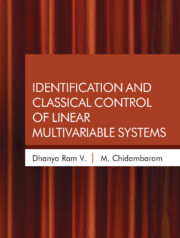Book contents
- Frontmatter
- Contents
- Preface
- Acknowledgements
- List of Abbreviations
- Notations
- 1 Models, Control Theory, and Examples
- 2 Identification and Control of SISO Systems
- 3 Introduction to Linear Multivariable Systems
- 4 CRC Method for Identifying TITO Systems
- 5 CRC Method for Identifying SISO Systems by CSOPTD Models
- 6 CRC Method for Identifying TITO Systems by CSOPTD Models
- 7 Identification of StableMIMO System by Optimization Method
- 8 Identification of Centralized ControlledMultivariable Systems
- 9 Identification of Multivariable SOPTD Models by Optimization Method
- 10 Identification of Unstable TITO Systems by Optimization Technique
- 11 Centralized PI Controllers Based on Steady State Gain Matrix
- 12 SSGM Identification and Control of Unstable Multivariable Systems
- 13 Control of Stable Non-square MIMO Systems
- 14 Control of Unstable Non-square Systems
- 15 Trends in Control ofMultivariable Systems
- Appendix A Identification of Unstable Second Order Transfer Function Model with a Zero by Optimization Method
- Appendix B For Chapter 3
- Appendix C For Chapter 7
- Bibliography
- Index
1 - Models, Control Theory, and Examples
Published online by Cambridge University Press: 31 July 2022
- Frontmatter
- Contents
- Preface
- Acknowledgements
- List of Abbreviations
- Notations
- 1 Models, Control Theory, and Examples
- 2 Identification and Control of SISO Systems
- 3 Introduction to Linear Multivariable Systems
- 4 CRC Method for Identifying TITO Systems
- 5 CRC Method for Identifying SISO Systems by CSOPTD Models
- 6 CRC Method for Identifying TITO Systems by CSOPTD Models
- 7 Identification of StableMIMO System by Optimization Method
- 8 Identification of Centralized ControlledMultivariable Systems
- 9 Identification of Multivariable SOPTD Models by Optimization Method
- 10 Identification of Unstable TITO Systems by Optimization Technique
- 11 Centralized PI Controllers Based on Steady State Gain Matrix
- 12 SSGM Identification and Control of Unstable Multivariable Systems
- 13 Control of Stable Non-square MIMO Systems
- 14 Control of Unstable Non-square Systems
- 15 Trends in Control ofMultivariable Systems
- Appendix A Identification of Unstable Second Order Transfer Function Model with a Zero by Optimization Method
- Appendix B For Chapter 3
- Appendix C For Chapter 7
- Bibliography
- Index
Summary
The Classical Control Theory studies the physical systems and the control design in the frequency domain, while the Modern Control Theory is in the time domain. Systems in the frequency domain are expressed in transfer functions (via Laplace Transforms), while the time-domain systems are described in state–space representations (a set of first order differential equations). State–space is commonly used to model Multiple Input and Multiple Output (MIMO) systems, like spacecrafts, aircrafts, automobiles, marine vessels, and so on. In this chapter, a basic review of the Classical Control Theory and the Modern Control Theory will be done.
Classic Control Theory vs Modern Control Theory
The Classical Control Theory and the Modern Control Theory are the two control theories available. The classical control method (introduced before 1950) considers (Seborg et al. 2006) root locus, and Bode, Nyquist, and Routh–Hurwitz methods, which make use of the transfer function model. Multiple Input and Multiple Output (MIMO) systems were considered one loop at a time. Modern control method refers to stat–space methods developed in the late 1950s and early 1960s. Here the systemmodels are considered in the time domain.Analysis and design are carried out in time domain by using computers and advanced numerical methods.
During 1960s, the system representation and analysis were carried out in state variable form (representation by n first-order differential equations). An excellent review of classical control of multivariable systems is given by Skogestad and Postlethwaite (2005). Excellent review on Modern control theory is given by Gopal (2014) and Ogata (2017).
Systemmodels can be developed by two distinct methods.Analyticalmodelling consists of a systematic application of basic physical laws to system components and the inter connection of these components. Experimental modelling, or modelling by synthesis, is the selection of mathematical relationships which seem to fit observed input–output data.
The computational effort in analysing and designing controllers by the Modern Control Theory is increased only marginally for higher order systems. To design the controllers, all the state variables are to be available for measurement. In the Classical Control Theory, the interactions among the feedback loops are to be evaluated and taken into account in designing the controllers. Given the system description in the state–space form, the derivation of the transfer function matrix model is unique, whereas given the transfer function matrix, the derivation of the state space model description is not unique (Gopal, 2014).
- Type
- Chapter
- Information
- Publisher: Cambridge University PressPrint publication year: 2023

